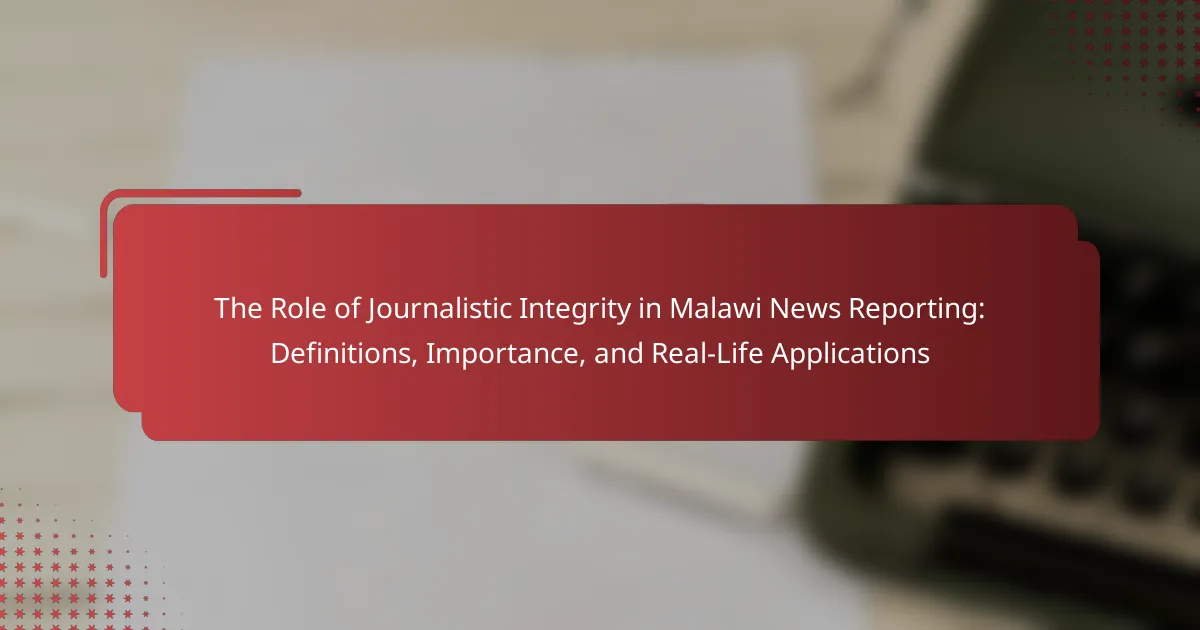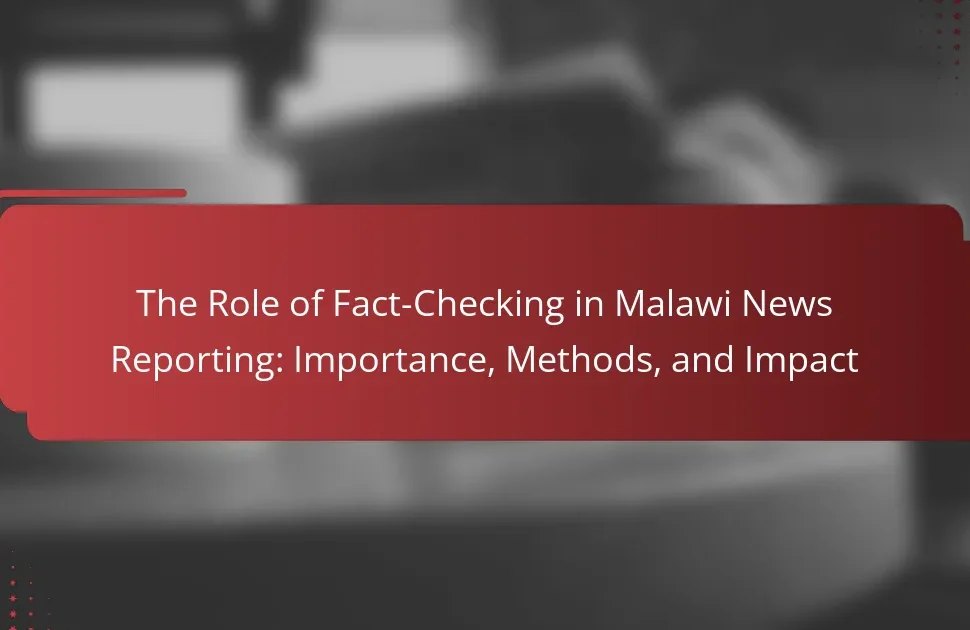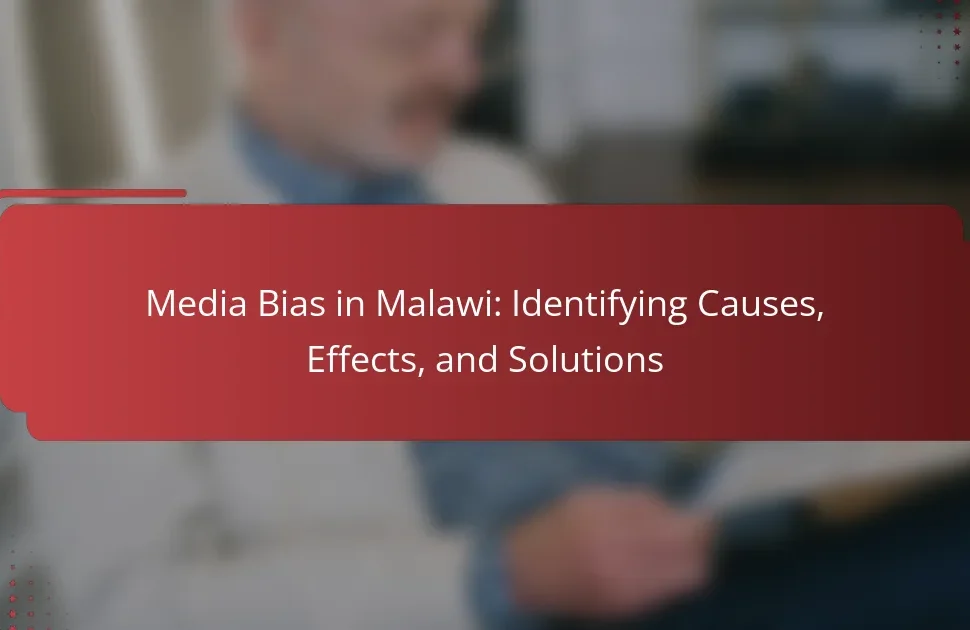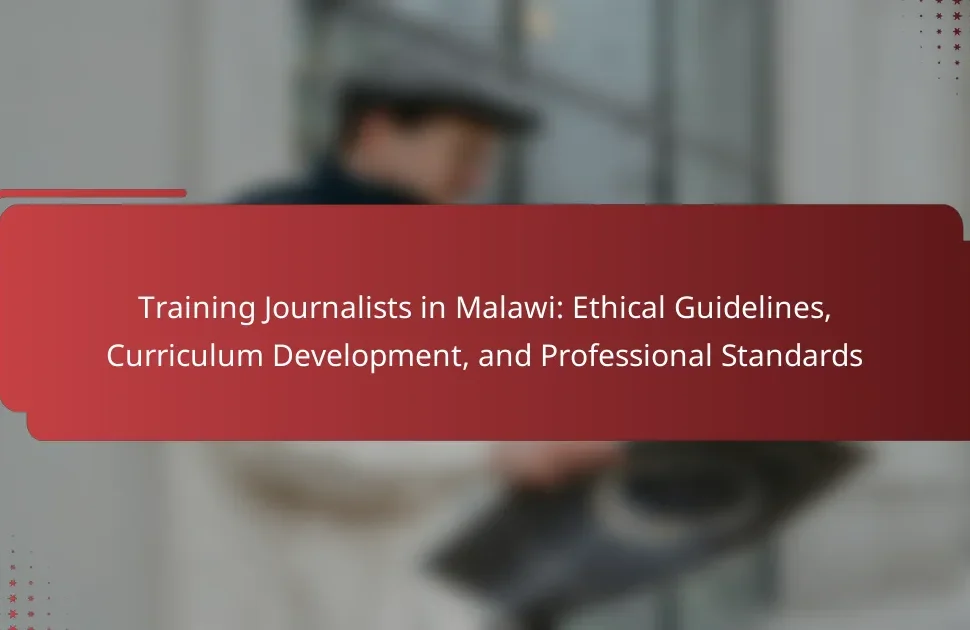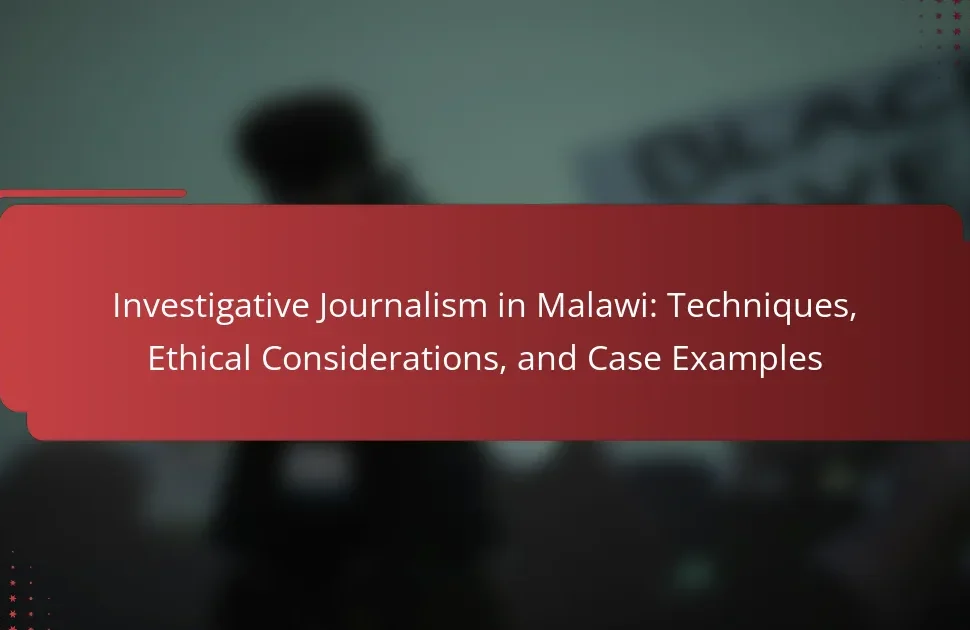Journalistic integrity in Malawi news reporting encompasses the ethical standards of accuracy, fairness, and accountability that guide journalists. This integrity is essential for maintaining public trust, especially in a context where media significantly influences public opinion. The article highlights the challenges faced by journalists in Malawi, including political pressure, limited resources, and safety threats, which can compromise reporting quality. It also outlines practices that promote journalistic integrity, such as adherence to ethical standards, fact-checking, and the role of regulatory bodies in ensuring responsible journalism. Ultimately, the commitment to these principles is crucial for fostering informed citizenship and democratic engagement in Malawi.
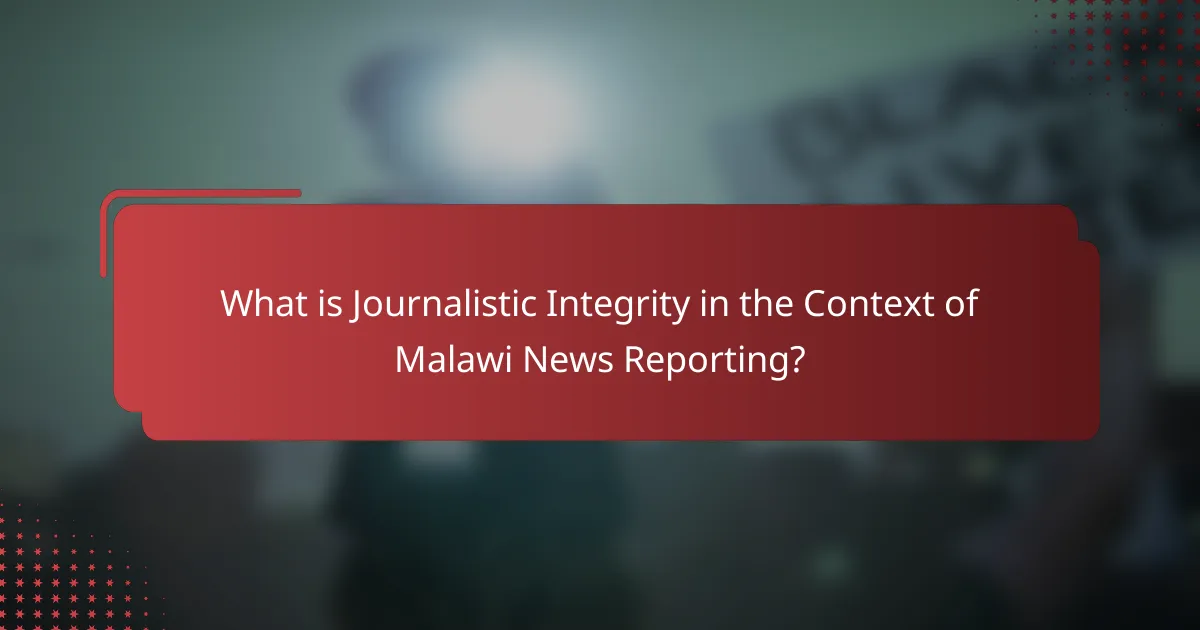
What is Journalistic Integrity in the Context of Malawi News Reporting?
Journalistic integrity in the context of Malawi news reporting refers to the ethical standards and principles that guide journalists in their work. It encompasses accuracy, fairness, and accountability in reporting. Journalists in Malawi are expected to provide truthful information and avoid misleading the public. This integrity is crucial for maintaining public trust in the media. In Malawi, where media can influence public opinion significantly, adherence to these principles is essential. Research indicates that a commitment to journalistic integrity can enhance the credibility of news outlets. This credibility is vital for fostering informed citizenship and democratic engagement in the country.
How is journalistic integrity defined within Malawi?
Journalistic integrity in Malawi is defined as the adherence to ethical standards and principles in reporting. It encompasses accuracy, fairness, and accountability in news coverage. Journalists are expected to verify facts before publication. They must provide balanced perspectives and avoid conflicts of interest. Ethical guidelines are established by organizations like the Malawi Editors Forum. These guidelines promote transparency and responsible journalism. Violations can lead to loss of credibility and legal consequences. The importance of integrity is underscored by the need for public trust in the media.
What are the key principles that constitute journalistic integrity?
Key principles that constitute journalistic integrity include accuracy, fairness, accountability, and transparency. Accuracy involves reporting facts correctly and verifying information before publication. Fairness ensures that all sides of a story are represented without bias. Accountability means journalists take responsibility for their work and correct any errors. Transparency involves being open about sources and methods used in reporting. These principles help maintain trust between journalists and the public. Research by the Pew Research Center shows that 62% of Americans believe accuracy is the most important quality in news reporting.
How does journalistic integrity differ from other forms of ethical reporting?
Journalistic integrity emphasizes truthfulness, accuracy, and accountability in reporting. It requires journalists to adhere to a strict code of ethics that prioritizes fact-checking and the minimization of bias. Other forms of ethical reporting may focus on broader principles such as fairness and respect for sources. However, journalistic integrity specifically mandates a commitment to uncovering and presenting the truth, often under challenging circumstances. For example, the Society of Professional Journalists outlines a code that includes seeking truth and providing a fair and comprehensive account of events. This distinction is vital in maintaining public trust and credibility, especially in regions like Malawi, where media integrity can significantly impact societal issues.
Why is journalistic integrity important for Malawi’s media landscape?
Journalistic integrity is crucial for Malawi’s media landscape because it fosters trust between the media and the public. Trust is essential for a functioning democracy. In Malawi, where misinformation can easily spread, integrity ensures accurate reporting. Accurate reporting helps inform citizens about critical issues affecting their lives. Moreover, journalistic integrity upholds accountability among public officials. It encourages transparency in governance. Studies show that media credibility directly impacts public engagement in democratic processes. Therefore, maintaining high ethical standards in journalism is vital for Malawi’s societal progress.
What impact does journalistic integrity have on public trust in media?
Journalistic integrity significantly enhances public trust in media. When journalists adhere to ethical standards, they provide accurate and reliable information. This fosters credibility and accountability within the media. Research by the Pew Research Center shows that trust in news media is closely linked to perceived accuracy and fairness. A 2021 survey indicated that 65% of respondents valued factual reporting as essential for trust. Furthermore, consistent integrity leads to a more informed public. An informed public is more likely to engage with news sources positively. Therefore, maintaining journalistic integrity is crucial for sustaining public trust in media.
How does journalistic integrity influence the quality of news reporting?
Journalistic integrity directly enhances the quality of news reporting. It ensures accuracy, fairness, and accountability in the information presented. When journalists adhere to ethical standards, they provide reliable content. This builds public trust in the media. High-quality reporting requires thorough fact-checking and unbiased perspectives. According to the Society of Professional Journalists, ethical journalism fosters informed communities. In Malawi, maintaining integrity can combat misinformation and promote transparency. Thus, journalistic integrity is essential for credible and impactful news reporting.
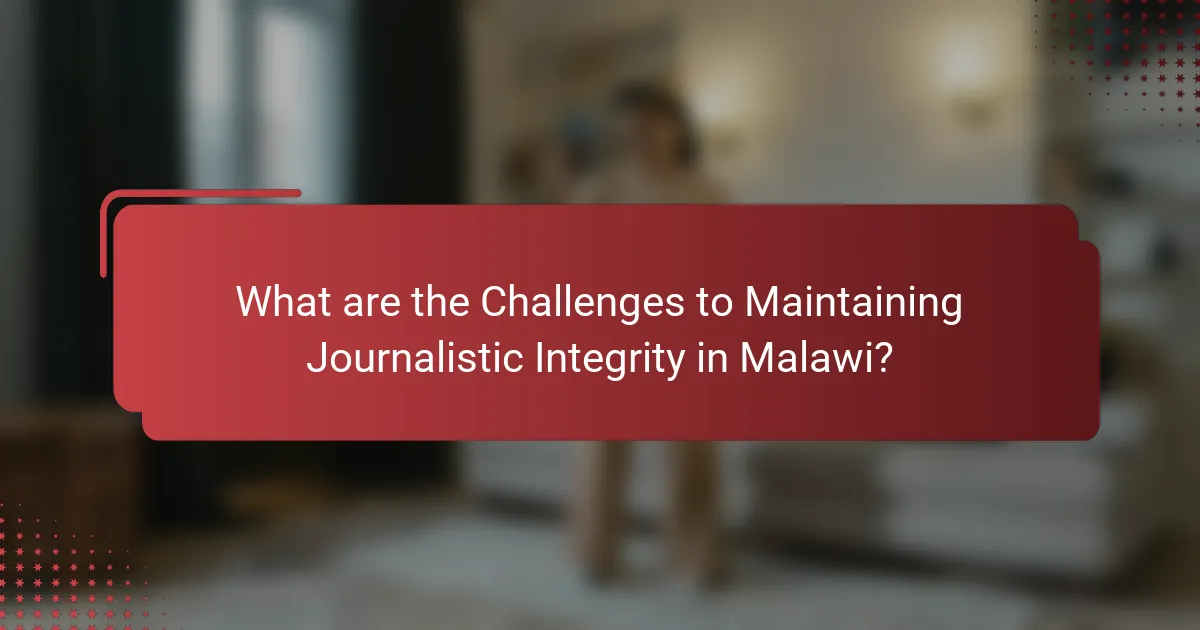
What are the Challenges to Maintaining Journalistic Integrity in Malawi?
Challenges to maintaining journalistic integrity in Malawi include political pressure, limited resources, and threats to safety. Journalists often face intimidation from government officials and political parties. This pressure can lead to self-censorship and biased reporting. Limited financial resources restrict access to training and technology. Additionally, the safety of journalists is at risk, with instances of harassment reported. These factors collectively undermine the quality and reliability of news reporting in Malawi.
What external factors threaten journalistic integrity in Malawi?
External factors threatening journalistic integrity in Malawi include government censorship and political pressure. The Malawi government has been known to suppress dissenting voices. Journalists often face intimidation from authorities when reporting on sensitive issues. Economic challenges also undermine media independence. Many media outlets rely on government advertising, which can lead to biased reporting. Additionally, the influence of foreign donors can create conflicts of interest. The lack of robust legal protections for journalists further exacerbates these threats. In 2021, Reporters Without Borders ranked Malawi 86th in press freedom, highlighting ongoing concerns.
How do political pressures affect news reporting integrity?
Political pressures can significantly undermine news reporting integrity. Journalists may face threats or coercion from political entities aiming to influence coverage. This can lead to biased reporting, where facts are distorted to align with political agendas. In Malawi, instances of government pressure on media outlets have been documented. Such pressures can result in self-censorship among journalists. The Malawi Communications Regulatory Authority has reported cases where media independence is compromised. This affects public trust in news sources. A lack of transparency in political actions further complicates the situation. Overall, political pressures create an environment where objective journalism is challenged.
What role do economic constraints play in journalistic integrity?
Economic constraints significantly impact journalistic integrity. Limited financial resources can lead to compromised reporting standards. Journalists may prioritize stories that attract advertising revenue over those that serve public interest. This shift can result in biased reporting and sensationalism. For instance, media outlets facing budget cuts may reduce investigative journalism efforts. A study by the Pew Research Center found that 62% of journalists believe economic pressures affect their work. Consequently, the integrity of news reporting can be undermined when financial viability takes precedence over ethical standards.
What internal challenges do journalists face in upholding integrity?
Journalists face several internal challenges in upholding integrity. One significant challenge is the pressure to conform to organizational biases. This can lead to the compromise of impartial reporting. Another challenge is the fear of losing their jobs due to editorial decisions. Journalists may feel compelled to prioritize sensationalism over accuracy. Additionally, the influence of advertising revenue can create conflicts of interest. Journalists may struggle to maintain objectivity when financial considerations are involved. A lack of editorial independence can further complicate their ability to report truthfully. These challenges collectively hinder the pursuit of journalistic integrity.
How does the lack of training impact journalistic integrity?
The lack of training significantly undermines journalistic integrity. Untrained journalists may struggle to verify facts accurately. This can lead to the dissemination of misinformation. Misinformation erodes public trust in media outlets. Additionally, untrained journalists may not adhere to ethical standards. This can result in biased reporting and conflicts of interest. For instance, a study by the Pew Research Center found that 62% of Americans believe news organizations often report news inaccurately. Therefore, inadequate training directly affects the credibility of journalism.
What ethical dilemmas do journalists encounter in their reporting?
Journalists encounter several ethical dilemmas in their reporting. These dilemmas include balancing the public’s right to know with individual privacy rights. For instance, reporting on sensitive issues can harm individuals’ reputations or well-being. Journalists also face the challenge of ensuring accuracy while meeting tight deadlines. Inaccurate reporting can lead to misinformation and public distrust.
Another dilemma involves conflicts of interest. Journalists must avoid situations where their personal interests may compromise their objectivity. Additionally, they may struggle with the ethical implications of using anonymous sources. While anonymity can protect sources, it can also lead to questions about credibility.
Finally, journalists often grapple with the representation of marginalized communities. They must navigate the fine line between giving a voice to the voiceless and potentially exploiting their stories for sensationalism. These ethical dilemmas are crucial as they directly impact journalistic integrity and public trust in the media.

How is Journalistic Integrity Practiced in Real-Life Applications in Malawi?
Journalistic integrity in Malawi is practiced through adherence to ethical standards and accountability. Journalists prioritize accuracy by verifying information before publication. They engage in fact-checking to ensure credible reporting. Malawi’s media houses often have editorial guidelines that promote transparency. Journalists also strive for impartiality by presenting multiple viewpoints. Training programs for journalists emphasize ethical reporting practices. The Malawi Communications Regulatory Authority monitors media conduct and enforces regulations. These practices help build public trust in the media.
What are some examples of journalistic integrity in action in Malawi?
Journalistic integrity in Malawi is exemplified through investigative reporting on corruption. Journalists have exposed misuse of public funds by government officials. For instance, the “Cashgate” scandal revealed significant financial mismanagement in 2013. This led to public outcry and governmental reforms. Additionally, media outlets like Malawi24 uphold ethical standards by fact-checking and providing balanced news coverage. These actions promote accountability and transparency in governance. Furthermore, journalists often risk their safety to report on sensitive issues, demonstrating a commitment to truth. Such examples highlight the essential role of journalistic integrity in Malawi’s democratic processes.
How have specific news stories exemplified journalistic integrity?
Specific news stories have exemplified journalistic integrity by adhering to ethical standards and factual reporting. For instance, the coverage of the 2019 Malawi presidential elections showcased a commitment to transparency. Journalists fact-checked claims made by candidates and reported on electoral irregularities. This ensured that the public received accurate information about the election process. Another example is the investigative reporting on corruption in government. Journalists uncovered misuse of public funds, which led to accountability measures. These instances illustrate how responsible reporting upholds the principles of journalistic integrity.
What role do fact-checking and verification play in maintaining integrity?
Fact-checking and verification are essential for maintaining integrity in journalism. They ensure that information presented to the public is accurate and reliable. This process helps to build trust between journalists and their audience. When facts are verified, misinformation is reduced, which protects the credibility of news outlets. Studies show that audiences are more likely to trust sources that consistently fact-check their information. In Malawi, maintaining journalistic integrity is crucial for informed public discourse. The practice of verification can prevent the spread of false narratives that could harm society. Thus, fact-checking serves as a cornerstone for ethical journalism and responsible reporting.
What best practices can journalists adopt to enhance integrity in their reporting?
Journalists can enhance integrity in their reporting by adhering to several best practices. First, they should verify facts through multiple credible sources before publishing. This reduces the risk of spreading misinformation. Second, transparency is crucial. Journalists must disclose their sources whenever possible to build trust with their audience. Third, they should strive for objectivity, presenting all sides of a story fairly. This approach minimizes bias and promotes balanced reporting. Fourth, journalists should adhere to ethical guidelines established by reputable organizations, such as the Society of Professional Journalists. These guidelines provide a framework for responsible journalism. Finally, continuous training in media literacy and ethics is essential. This helps journalists stay informed about evolving standards and practices in the industry.
How can training and education improve journalistic practices in Malawi?
Training and education can significantly enhance journalistic practices in Malawi by equipping journalists with essential skills. Improved skills lead to better reporting accuracy and ethical standards. Education programs can cover topics such as fact-checking, investigative journalism, and media ethics. These programs help journalists understand the importance of integrity in their work.
In Malawi, initiatives like the Malawi Institute of Journalism provide structured training. Graduates from such programs often demonstrate higher professionalism in reporting. Research indicates that countries with robust journalism education see increased public trust in media. This trust is crucial for democracy and informed citizenry.
Moreover, ongoing training helps journalists adapt to changing media landscapes. It prepares them for challenges like misinformation and digital reporting. By fostering a culture of continuous learning, journalistic integrity in Malawi can be strengthened.
What strategies can journalists use to resist external pressures?
Journalists can resist external pressures by adhering to ethical standards and maintaining independence. They should prioritize fact-checking to ensure accuracy in their reporting. Building a strong network of trusted sources can help journalists verify information and resist manipulation. Training in media literacy allows journalists to recognize biases and external influences. Establishing a clear editorial policy can guide decision-making and uphold integrity. Engaging with the audience fosters transparency and accountability, making it harder for external pressures to sway reporting. Additionally, collaborating with press freedom organizations can provide support and resources for journalists facing external challenges.
What are the future implications for journalistic integrity in Malawi?
Future implications for journalistic integrity in Malawi include increased scrutiny of media practices and potential regulatory changes. The rise of digital platforms may challenge traditional journalism standards. Misinformation and fake news could undermine public trust in media. Ongoing political pressures may affect journalists’ ability to report freely. Increased advocacy for press freedom could strengthen journalistic integrity. The role of fact-checking organizations may become more prominent. Training programs for journalists may enhance ethical reporting standards. Collaboration between media organizations may foster accountability and transparency.
How might changing technologies affect journalistic integrity?
Changing technologies can significantly impact journalistic integrity. The rise of social media allows for rapid news dissemination, but it also leads to the spread of misinformation. Journalists may face pressure to prioritize speed over accuracy due to technological advancements. This can compromise fact-checking processes, resulting in lower standards of reporting. Moreover, algorithms can create echo chambers that reinforce biased narratives. A study by the Pew Research Center found that 64% of Americans believe fabricated news stories cause confusion about current events. Therefore, while technology can enhance access to information, it also poses challenges to maintaining journalistic integrity.
What steps can be taken to promote a culture of integrity in Malawi’s media?
Promoting a culture of integrity in Malawi’s media can be achieved through several key steps. Establishing a robust code of ethics for journalists is essential. This code should outline standards for accuracy, fairness, and accountability. Training programs focused on ethical journalism can enhance reporters’ understanding of integrity. Regular workshops can keep journalists updated on best practices and ethical dilemmas.
Encouraging transparency in media operations fosters trust among the public. Media organizations should disclose funding sources and ownership structures. Implementing fact-checking mechanisms can reduce misinformation and bolster credibility. Collaboration with international media organizations can provide resources and support for integrity initiatives.
Public awareness campaigns can educate citizens about the importance of media integrity. Engaging the audience in discussions about ethical journalism promotes a culture of accountability. These steps collectively contribute to a stronger foundation for integrity in Malawi’s media landscape.
The main entity of the article is journalistic integrity in the context of Malawi news reporting. The article defines journalistic integrity as the adherence to ethical standards, including accuracy, fairness, accountability, and transparency, which are vital for maintaining public trust in media. It discusses the importance of these principles for fostering informed citizenship and democratic engagement, while also addressing challenges such as political pressure, economic constraints, and the need for training. Additionally, the article highlights real-life applications of journalistic integrity in Malawi, exemplified through investigative reporting and adherence to ethical guidelines.
